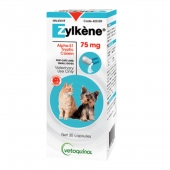When your cat purrs as they’re curled up on your lap, basking in the sun and being gently scratched behind their ears, you can be pretty sure they’re enjoying the moment. But what about when your cat purrs during a thunderstorm? Or next to their empty food bowl? While we still don’t fully understand why cats purr, we know they do it for other reasons than just to express happiness.
How cats purr
As they inhale and exhale, cats can purr by quickly tightening and releasing their diaphragmatic and laryngeal muscles. This rapid movement causes vibrations which can be felt and heard over short distances. This is a handy way for mother cats to lead their kittens, who are blind and deaf for several days after being born. Cats can also purr at a wide range of frequencies, from a very low 26 Hertz up to a high 520 Hertz, which may serve different purposes.
Your cat probably purrs because they’re happy
When your cat looks relaxed, eyes half closed and breathing at a slow and steady pace, purring is most likely a way for them to express their happiness. It’s a natural reaction, similar to how humans smile or laugh when feeling joy, and typically the most common reason why cats purr.
Cats may purr to soothe themselves
It’s also believed cats may purr when facing stressful situations or feeling anxious in order to soothe themselves, the way a child would suck their thumb. If your cat purrs while hiding or if they’re displaying subtle signs of pain, they may be trying to comfort themselves.
Cats may purr when they’re hungry
A 2009 study published in Current Biology reports that cats may purr more urgently, with greater insistency and at a higher frequency when they’re hungry. Even study participants who had never owned a cat were able to hear the difference. These “solicitation purrs” can reach a frequency of 220 to 520 Hertz, which is very similar to those of a human baby crying (300 to 600 Hertz), and a great way to get your attention.
Purring may promote healing
Very low frequency vibrations have been proven to help promote tissue and bone regeneration, build muscle and lessen swelling. Even NASA has experimented with using vibration therapy to help astronauts maintain healthy muscles and bones while in space. Your cat may purr after getting injured from a fall or fighting with another animal.
How can you tell why your cat is purring?
Humans laugh when something is funny, but also when expressing irony and feeling uncomfortable or nervous: it’s all about context. Similarly, pay attention to the events taking place when your cat is purring to make an educated guess. If it’s dinnertime, they’re likely hungry. If you’re coming back from a visit to your veterinary clinic, they may need comforting. And if they purr as they cuddle up and rub their head against you, it’s safe to assume they’re feeling great.



